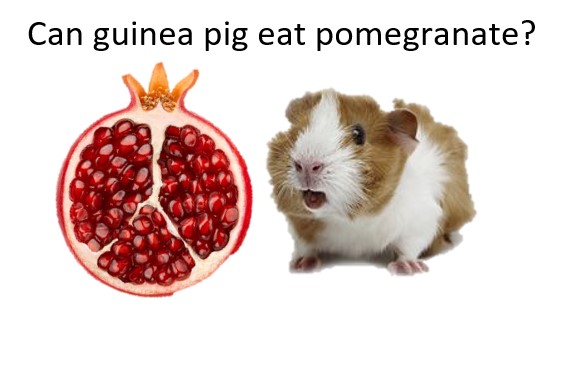Guinea pigs are lovely and cute pets that can go through fresh fruits and vegetables quite quickly. As a pet owner, you may ask, can your furry friend eat a pomegranate fruit with seed full of juice, renowned for its color and health benefits? Fret not! While pomegranates come with numerous vitamins and antioxidants, there are some issues that need consideration before serving them to your furry friend.
In this article, we will consider the interesting question of analyzing the nutritional value, health benefits and risks, avoiding serving sizes, and other healthier fruit options for your guinea pigs in order to keep them content and healthy.
Pomegranates’ nutritional content and benefits are often described in one word: super food. Here, let’s look at the specifics that make pomegranate prove to be so beneficial.
This post :-Can Guinea Pig Consume Plums?
Pomegranates are beneficial for guinea pigs because:
Guinea pigs are exceptional pets, but in order to help guinea pigs lead a healthy lifestyle, pet owners need to depend on nutritious food. Pomegranates are beneficial for guinea pigs because they contain Vitamin C which helps set up their immune system, stops them from fatal diseases, and ensures that healthy chances of scurvy doesn’t cross their path.
Includes Fiber – Dietary fiber aids in the digestion of food and ensures the proper working of the digestive system for the guinea pig.
Hydration Boost – The high water content keeps guinea pigs hydrated, especially during warm weather.
Natural Sugars – Sweets in moderation can boost energy levels, but too much can cause other health concerns.
Potassium and Other Minerals – Pomegranates have potassium, which can assist in proper muscle and heart function in guinea pigs.
Low in Fat and Protein – This makes it an ideal weight-friendly snack when offered in moderation.
Can Guinea Pigs Eat Pomegranate?
Yes, guinea pigs can eat pomegranate, but only in moderation and rarely. The fruit has lots of useful nutrients, however, it can also be risky if not managed properly.
Pomegranate Considerations for Guinea Pigs
High Sugar Content – The sugar content in pomegranates can accelerate chances of obesity and diabetes if frequently ingested.
Acidity Levels – Excessive consumption of the fruit can also lead to mouth sores and stomach discomfort as it is mildly acidic.
Threat of Choking From Seeds – The seeds of a pomegranate are small in size yet strong, and so they cannot be chewed or broken down easily. They can also lead to choking or hinder bowel movements.
Sticky Residue on Teeth – The juices that the fruit carries have the potential to stick to the teeth of a guinea pig. The sticky residue can turn out to be problematic medically, especially when not treated over a period of time.
Digestive Sensitivity – When consuming different fruits like pomegranate, certain guinea pigs may experience diarrhea or upset more easily than others. Their body has a unique approach towards new foods and may be sensitive in certain aspects.
Best Practices on How to Feed Pomegranate to Guinea Pigs
In the event that you have decided to portion a guinea pig a pomegranate, make sure to follow these tips in order to make sure their health is in check and isn’t jeopardized.
Offer Small Portions – Just a few tiny arils(also known as seeds) should the be the limit as any more can lead to weight gain and an intake of excess sugar.
Remove the Seeds If Necessary – If there is a concern of the guinea pig choking, it is best to pre remove and crush the seeds too.
Monitor for Reactions – Once the guinea pig is allowed to try out the pomegranate, keep a close watch to observe them for any signs of unusual behavior or signs of discomfort in the body.
Avoid the Peel – Pigs, unlike humans are not built for the thick and bitter outer peel. As a result, it is unsuitable as it’s tough to digest.
Feed in Moderation – Pomegranates are best used as an occasional treat rather than consistency, so feed only in moderation.
Wash the Fruit Thoroughly – Before giving the fruit to the guinea pigs make sure to wash them in order to get rid of pesticides that are harmful.
Blend with Other Fruits – Some pomegranate can be mixed with equally safe other fruits which are great if your guinea pig’s diet has some variety.
Can Guinea Pigs Eat Pomegranate Peels?
Clothing claws, however, may contain fabric and fibers that impede their stomachs. And so, breakage will lead to issues in potential substances which maybe very difficult for them to break down. Therefore, guinea pigs should not consume pomegranate peels.
Alternative Fruits for Guinea Pigs
If you’re looking for alternatives, you may try the following:
Strawberries – Contains a lot of sugar and has a great deal of vitamin C.
Blueberries – High concentration of antioxidants that are safe in limited quantities.
Apples (without seeds) – One of the crunchier treats that guinea pig never refuses.
Bananas – Soft and friendly in digestion, although moderation is crucial for the sake of sugar.
Watermelon – Juicy and refreshing but don’t forget to take the seeds out before eating.
Pears – Rather sweet and a great source of fiber.
Papaya – Has enzymes that help digestion improving overall gut health.
Cucumber – Great for daily snacking as it sweetheart and low in sugar.
These fruits emit a substations load and vary in nutrients while minimizing the risks to health.
How Often Should Guinea Pigs Consume Pomegranates?
Because pomegranates are high in sugar and have an acidic content, moderation is important. To avoid exceeding the sugar limit, a small serving every couple of weeks is enough to offer the health benefits.
Indicators of Potential Negative Reactions
Each time a new type of food is introduced to a guinea pig, potential negative reactions to such changes must be kept track of. Pudding, for example, should never be given to guinea pigs with sweet tooth’s as they are prone to the following:
- Loose stool or diarrhea
- Absence of eating
- Increased acts of inactivity
- Drooling or bound mouth
- Changes and variability in behavior

Basic tips for maintaining diet for a healthy guinea pig are:
Allow unlimited fresh hay – hay is one of the primary sources in the diet of guinea pigs as it adds great value to their dental and digestion health.
Give additional veggies – Include vegetables that are leafy such as romaine lettuce, cilantro, and bell peppers because these should always be included in the diet.
Restrict fruits – Given the level of sugar content fruits possess, they should not be a part of the everyday food for nuts.
Provide water – Clean, fresh supply of drinking water should also be made available.
Check and Monitor their health – take note of their weight, whether they are clinically as well as behaviorally active.
See post: What is the Social Behavior of a Guinea Pig?
Frequently Asked Questions (FAQs)
Can guinea pigs eat pomegranate every day?
No, guinea pigs should not eat pomegranate on a daily basis. Its high sugar and acidity levels means it is best served every couple of weeks in small portions to mitigate obesity or digestive problems.
Are pomegranate seeds safe for guinea pigs?
Pomegranate seeds can be served to guinea pigs, however, it is important to note that these seeds can be a choking hazard, especially for younger or smaller guinea pigs. Bruising of the seeds is encouraged, eliminating the risk of choking.
Can guinea pigs drink pomegranate juice?
No, pomegranate juice is too dense with sugar and acidic content for guinea pigs to consume. This can cause a multitude of digestive and dental problems. Pomegranate juice should also never replace fresh water as the main source of hydration.
What happens if my pet guinea pig eats pomegranate?
If your guinea pig has an upset stomach, less appetite, or diarrheic, it can be due to overfeeding pomegranates. In case, you notice any of these symptoms, immediately inform your vet and stop feeding those pomegranates.
What other fruits can I give my guinea pig?
Stone fruits like peaches and cherries (the pits are cyanide), kumquats, grapefruit, and tangerines (they’re too acidic), durable grapes or raisins (both bear a chance of poisoning), avocados (which are utterly lethal to guinea pigs).
Conclusion
Guinea pigs can benefit greatly from pomegranates, but you must remember to feed your pet in moderation. Although their content of vitamin C, antioxidants, and hydration is high, the level of sugar and acidity is also high which means that they should be served only on rare occasions. Peel the pomegranate first, take only a small portion, and ensure that you watch your pet closely afterward.


